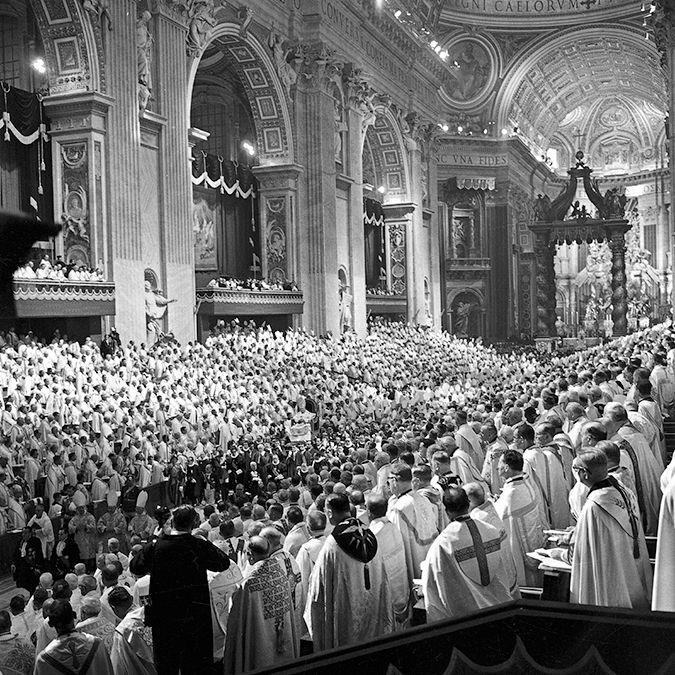When the 16 men celebrating their golden jubilees of priesthood this year began their religious studies, Masses were celebrated in Latin and the celebrant faced the tabernacle in an alcove along the back wall — not the congregation.
But with the Second Vatican Council having been in session two of its three years when they were ordained in 1964, all kinds of liturgical, scriptural and other changes were in the air. The class, in fact, was known as “the last of the old and the first of the new.”
Pope John XXIII, who convened the historic assembly, simply said it was time for the Catholic Church to open its windows and let in some fresh air. And as a result of Vatican II, the revisions would go way beyond renewing the sacred liturgy. The laity, the people in the pews, were viewed as equal members of the Church through Baptism. Everyone, in short, was called to holiness.
A greater emphasis was placed on Scripture, with readings from both the Old and New Testaments, in daily and Sunday liturgies. Bible-study groups were encouraged in parishes and dioceses. The Rite of Christian Initiation of Adults (RCIA) was reinstated as a formation process for men and women entering the Church; and the ministry of permanent deacons was restored.
The council also acknowledged that God’s presence went beyond the Catholic Church, resulting in ecumenical outreaches to different religions and faiths.
Moreover, especially with the document “Gaudium et Spes” (the Pastoral Constitution on the Church in the Modern World), that world wasn’t to be kept at some safe secular distance. Instead, the world and humankind were essentially good. The coming of Christ has begun a restoration that would reach its fulfillment at the end of time with Christ coming again.
And there were many more changes — including a new canon law, catechism, liturgical calendar, Bible translation plus new prayers and hymns — happening during the priestly formation and early priesthood of the jubilarians.
The Tidings caught up with the jubilarians before the evening Chrism Mass on April 14 at the Cathedral of Our Lady of the Angeles.
“Well, in the beginning, it was like the Church was so full of energy,” said Msgr. Charles Hill, former pastor of St. Basil Church in Los Angeles. “It was like being a kid going into a candy store and told you can have anything you want. But everything was changing, it was just so full of life and energy.”
Msgr. Royale Vadakin, former vicar general and moderator of the curia, pointed out that the revisions “didn’t come strangely because the council was underway, so that we knew that changes were coming. And many of us had hoped that English, the vernacular, would be part of the liturgy. But it wasn’t when we were ordained. It was the first Sunday in Advent, which was November, that the first inclusion of English in the Mass happened.”
That elicited a nod from Msgr. Peter Amy, who served as associate, administrator and pastor of St. Didacus in Sylmar for 36 years: “And we no longer read the Scriptures alone in Latin. What we used to do at my first parish, St. Joseph in Santa Ana when Orange County was part of the archdiocese, we’d say the Scriptures in Latin and then we would go up in the pulpit and repeat them in English.”
With a straight face, Msgr. Vadakin quipped, “Bilingual is nothing new,” before all three broke up laughing.
The other big change the retired priests talked about was something that came later — facing the people while celebrating Mass. They agreed that when the change took place depended, at least in part, on the pastor’s willingness to accept the innovations. They further agreed on how much better they liked celebrating Mass with the congregation a more active, responsive part of the liturgy.
“The hardest thing about the whole thing was some of our classmates leaving ministry,” Msgr. Hill noted. “That was difficult to deal with for me.”
Msgr. Vadakin added, “I think the hardest thing was some parishioners who were opposed to the changes. So you had a little bit of a divided congregation sometimes. People didn’t want to change.”
“Some people would change more,” Msgr. Amy reported.
And for a moment, nobody spoke up.
“But it was an exciting time,” observed Msgr. Vadakin, with a growing grin. “We were the young boys of summer, and we’re now the older men of winter.”

